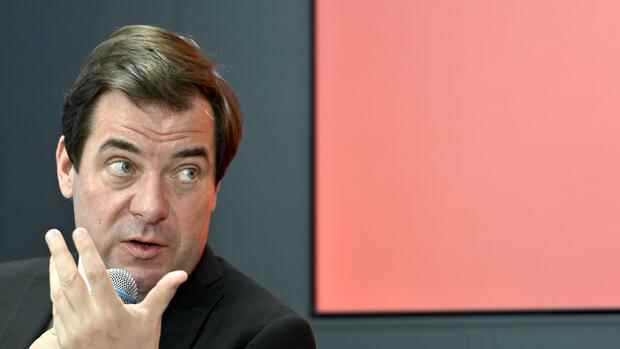Vienna Austria’s media have reported a lot in recent months about how the country’s politics are contaminated by “friendship” and corruption. But now even they, who are supposed to be “guardians of democracy”, have fallen into the twilight.
At the center of the most recent media scandals in Austria are Rainer Nowak, former editor-in-chief and publisher of the bourgeois-liberal quality newspaper “Die Presse” and Matthias Schrom, who was editor-in-chief at the public ORF for the information programs of the second channel. Both incidents show how close politics and journalism are in Austria – and how dangerous it can be to communicate flippantly in private chats.
For some time now, the Public Prosecutor’s Office for Economic Affairs and Corruption (WKStA) has been evaluating the chats of Thomas Schmid, former Secretary General in the Ministry of Finance. Its news flow has already brought down the ex-Chancellor Sebastian Kurz, now it is the “Presse” editor-in-chief Nowak. He absolutely wanted to become director general of the ORF, which was also known to the government in Vienna. To achieve his goal, Nowak used his connections to Schmid, who in turn had a good connection to Kurz.
In the spring of 2019, Nowak asked Schmid how his hearing for the chief post at the federal holding company Öbag had gone. “Super” and “really good”, replied Schmid. Then he wrote: “Now you ORF boss. Age – but then it’s off. Thanks for everything.” Nowak replied: “A matter of honour. Now you have to help me with the ORF, please.” Schmid: “Absolutely.”
Top jobs of the day
Find the best jobs now and
be notified by email.
Apparently, Schmid’s help, which is not known exactly, did not bring much: Nowak did not do much: the post of general manager went to Roland Weißmann at the time.
Editor-in-chief opposed his own colleagues
Nowak tried to defend himself in the newspaper Der Standard, the more left-wing competitor of the Presse. There were “neither interventions nor any kind of influence on my part in the editorial office of the ‘Presse’,” he said.
Something similar to what happened in the “Presse” happened at the ORF, as has also become known these days. In the spring of 2019, the then Vice-Chancellor Heinz-Christian Strache complained to the editor-in-chief of News Schrom about a broadcast on ORF 1.
His chats with right-wing populist politician Heinz-Christian Strache got the journalist into trouble.
(Photo: dpa)
Instead of defending the reporting, Schrom at least partially agreed with the right-wing populist FPÖ politician. “So they’re trying to use force to get the dilapidated canal up. I’ve honestly been amazed for a long time that nobody is upset about what’s going on there in terms of content,” he wrote. In addition, he gave Strache advice on how he could intervene with his colleagues at ORF 1.
At ORF, Schrom’s messages to Strache caused irritation and shame. “The look of the chats is devastating,” says General Director Weißmann this week.
The former Austrian Vice-Chancellor tried to influence the coverage of public broadcasting.
(Photo: IMAGO/SEPA.Media)
In Vienna, the social center of Austria, the principle “one hand washes the other”, as expressed in the chats by Nowak and Schmid, is widespread among the elite as an expectation. However, the relationship between the media and politics goes far beyond the purely interpersonal. They are also anchored institutionally.
First of all, Austria’s media receive a lot of money from the state, which creates a certain dependency. According to the calculations of the non-profit foundation Medienhaus Wien, the public sector spent around 222 million euros on government advertising in the press in 2020.
Politics fills the board of trustees of public service broadcasting
In addition, the media received state press and radio funding of 32 million euros that year. The media house in Vienna ruled last year that the funding policy of Austria’s federal government had gotten out of hand in recent years.
Secondly, the institutional constitution of the ORF is an invitation for ambitious politicians to get involved with the broadcaster. The supreme body of the station is the Board of Trustees. It has a function similar to that of the supervisory board in a German company. Among other things, he appoints the general director of the station.
Politicians also use the committee to ensure their influence on the ORF. After all, 24 of the 35 current foundation board members were appointed by the federal government, the state governments and the parliamentary parties. The result of this electoral mechanism is that the ORF is drawn into the politicians’ power games again and again.
However, the ORF and the “Presse” have been aware of what is at stake for them since this week at the latest. Schrom resigned as editor-in-chief on Wednesday. The pressure from within the company had become too great. Nowak resigned from his post at the “Presse” on Friday. The newspaper’s parent company, the Styria Media Group, announced that the step was taken “above all to remove any appearance of bias and to protect the independence of the ‘Presse’ as a daily newspaper”.
More: Sebastian Kurz: A failed exceptional talent
